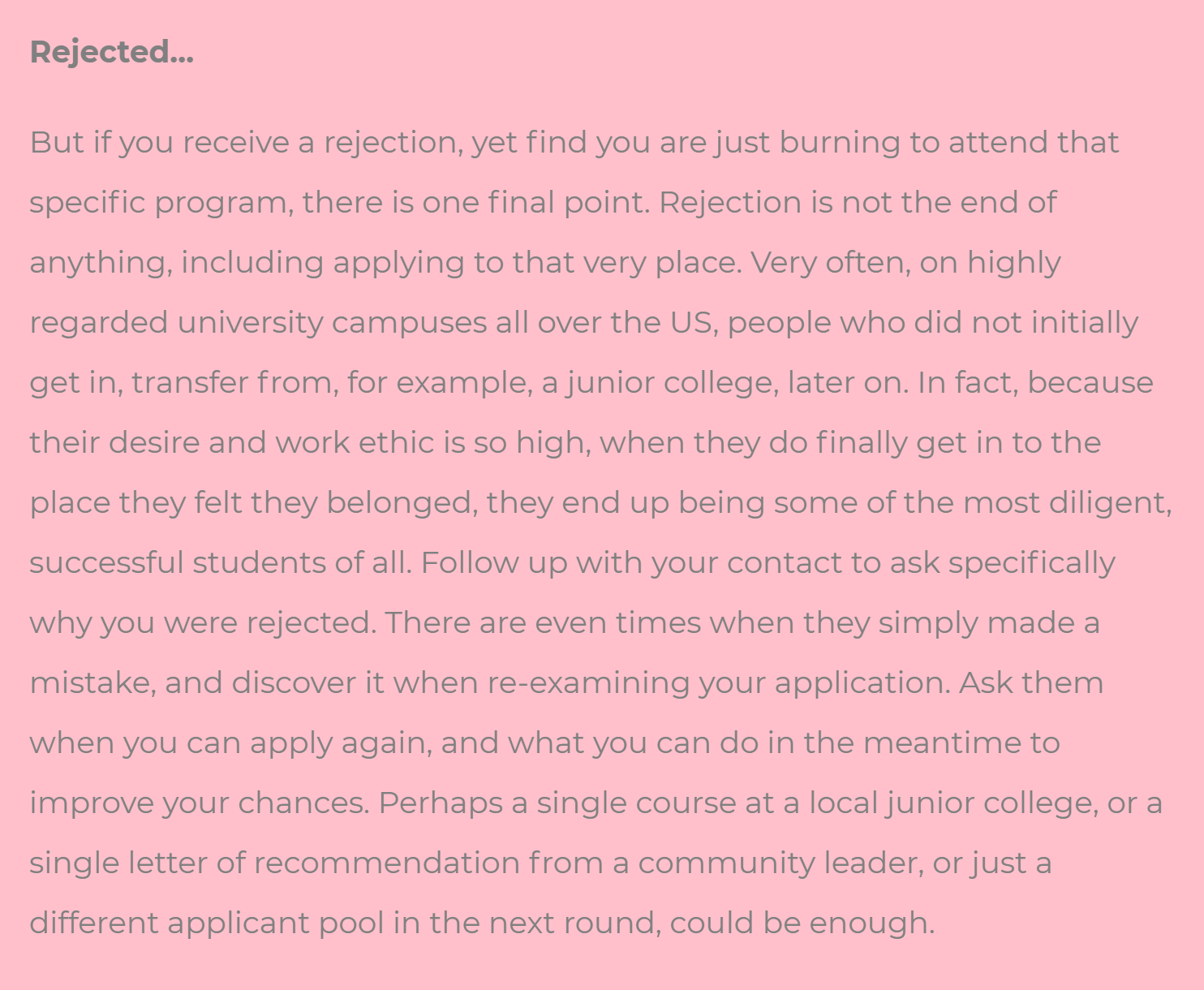You’ve decided it’s time to get that degree, and the right way for your life is to do it online. Welcome to the new wave of education. You’re on the bleeding edge already, and this can have advantages and disadvantages when compared to attending your college campus, physically.
EFFORT STARTS BEFORE THE FIRST CLASS
Maximizing the advantages starts with choosing the right program and the right university for you, then getting accepted. Just as when applying to any university, your background, your life, matters, no matter what your individual details are. And the process is similar to what so many students tackle, which is good news for you, because it is known. If you truly are ready to make the commitment, then that means you’re ready and eager to put in the work, which starts before your first class. In other words, right now get your head on right, treat the application process as something you welcome, as part of, not prior to, the new challenge you’re taking on.
THE FIRST STEP: INITIAL CONTACT
Once you have the short list of programs offering your undergraduate degree (we have a lot of resources here at OSR), every one of them is ready to walk you through precisely what they require. But first, they almost all ask you to fill out a simple, preliminary contact form to begin the process.
This is a good thing. If your program is going to work for you, you need to build a connection with it. Every organization, every university has its own personality, and just as they are evaluating you, you should evaluate them. You’re the one investing in your future. You are in the driver’s seat.
This is your life, your time and hard work, and your future. Don’t avoid the first phone call, or any after that. If they don’t try to schedule a phone conversation early on, you do it. Make a human connection with a real person. Save the name and contact information. If they ask about you, don’t take it as though someone is prying, or trying to “sell” you, treat it like an opportunity to discover if the fit is right for you.
Because that is one secret that few applicants understand going in, including many high school students applying to attend physical campuses. There are so many colleges out there, so many qualified professors, the challenge is not trying to find which big brand name to put on your resume, but discovering the program that gives you the most comfortable feeling, a fit that makes you know you belong. Without that, you won’t learn as well as you could.
Application Nerves
It’s a good gut check for you. People who aren’t fully committed to earning their degree yet may balk at the very start. Only you can answer whether any hesitation is based on the reality of your current circumstances, or just a little natural fear getting in the way of taking the plunge. Perhaps this will help: if they aren’t asking for your payment information yet, then there is no downside in submitting that first get-in-touch form.
Just remember this: they are dying to hear from you!
Online degree offerings are still relatively new, many universities have invested significantly—more so now than ever—and it’s only accelerating. The technology they employ to provide new online students with the necessary services represents a serious financial commitment. They realize how important it is for you to be able to say your degree is every bit as impressive as if it were earned on campus. The same faculty that teach in the classroom are responsible for educating online students. And the competition for students is real.
Narrow Down the List, Prepare Before the First Call
What’s in your control at this stage? Everything, but in particular, making a good first impression. If you’re not sure what to say, which questions to ask, read on, but admissions staff are trained—or they should be—to walk you through. It’s okay to be nervous. In fact there’s nothing wrong with letting the person on the other end of the line know if you are.
Before you make that first contact, consider this strategy: if you have a starting list of, say, five universities that most excite you, make your first contact with a sixth one…the one that didn’t quite make the cut. This will give you practice, and them the opportunity to make it onto your final list.
Preliminary Intel
Jot down questions concerning what they haven’t already told you on their website or other materials. Several programs provide information before you even fill out the form, such as letting you know to get your high school transcripts or GRE records organized, your professional resume if you’ve been out of school for awhile, any earned credits you may already have toward your degree, and other things to expect, such as an interview or essay topic. If there is anything on their list of requirements that you can’t provide, and they don’t state an alternative, then that’s definitely something you want to raise.
If they haven’t already made it clear, ask if there is any difference at all between the online degree you could earn and the one they award their campus graduates.
Beyond digging through website material, taking the time to watch any videos they may provide, the best way to start is that phone call to the admissions office. Well run offices reflect the personality of the university in which they function. Are they all-business, straight to the point, even blunt? If that’s for you, perfect. Or do you detect a little bit of humor, a sense of trying to make you feel at ease, of bonding on a personal level? If they break the ice just right as far as you’re concerned, it may be the fit for you. If they seem too cold, or too bubbly, or too much like a sales pitch…either you got unlucky with that first person you reached on the phone, or it’s not a match. Don’t run at the first sign of “ewww,” just let that little warning flag go up in the back of your mind and keep probing.
GOALS FOR THE FIRST CONVERSATION
Stick with simple goals for that first conversation:
1) Put your best foot forward, make a good first impression.
2) If they haven’t already shown you a full list, ask them precisely what they need for your complete application. If anything on the list confuses or concerns you, or may be difficult or impossible to provide, consider mentioning it right then.
3) Ask real questions that were not yet answered by their website or any email materials they sent you. If you find yourself drawing a blank, below are a few samples. (trust your gut whether to ask or not)
-
- For new online students, what are their most common early challenges with the program? For example, technological issues, or time management mistakes?
- What are some of the most common reasons applicants get rejected? Are they making avoidable mistakes?
- Are there support staff or guidance counselors ready to help new online students?
- What is the difference, if any, between the degree and course credits I can earn as an online student, and the degree for those who physically attend classes on campus?
- If none of these questions feel natural in any particular conversation, or they’ve already given you FAQs and other materials that answer everything you can think of, it’s always okay to go with: “Thank you, I have to digest all of the details and do some comparing. Is there anything else you think I should keep in mind while I’m researching options?”
- People always appreciate, well…appreciation. The person on the other end of the phone is probably leaving a little note for him or herself just as you hang up. That note will remain in their customer management system, permanently, so that any of their staff who want to help you in the future can be up to speed. A sincere thank you, genuine interest, and the fact that you respect yourself enough to shop around for the best circumstance for you…all builds the impression you want them to have once the conversation is done: “This is a student, a human being, we want. This person would be perfect for our program.”
CREATE A SHORT LIST OF PROGRAMS
The next step is, narrow down the list one more time if you haven’t already. College guidance counselors often mention, especially in these days of the common application, that students persist in applying to far more universities than they should. Even if it’s easy and you don’t mind the extra fees, over-applying is a mistake on an individual and system wide level. For you, it can take focus away from your search for the true short list of places where the fit might be perfect. It also makes admissions offices everywhere try to calculate how many people they need to reject, versus accept, which is often a moving target.
Try to limit your final list to as few as three: one school that is highly selective, a “reach” for you to get in; one that is right in line with your previous experience and achievements, but not just an automatic entry; and lastly one that you really feel should be an automatic acceptance, but still connected with you, your own personality. If you just can’t get down to three, make it four or five.
For those that make the cut
For whichever one you choose to apply first, it can’t hurt to ask your contact in the admissions office if they would look over your application, prior to formally submitting it. They may say they are not able to, or, if you’re lucky, they might take the time to offer guidance where you could improve your application package. For example, perhaps you didn’t include your first six month job as a teenager, but the admissions office believes it could be the final brush stroke on the full painting that is you.


IT’S ALL ABOUT THE FIT
And don’t forget, the fit should be mutual. You want to go where you are wanted. Sometimes the place that was second, or last, on your list, ends up being the best possible home, and produces benefits you can’t really measure in advance, for the rest of your life.
Most of all, not that you need it, best of luck to you! Please tell us how it goes!





